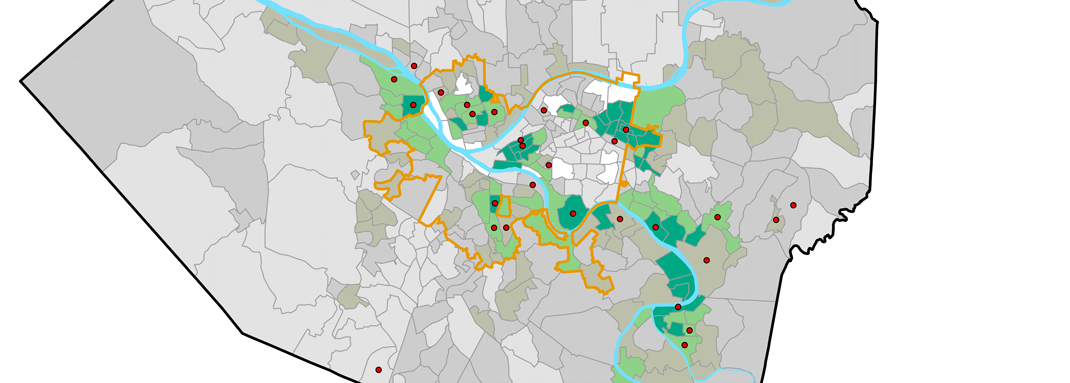We invite you to explore this page and its resources to learn about two data driven models—the Allegheny Housing Assessment (AHA) and the Mental Health Allegheny Housing Assessment (MH-AHA). These are decision support tools that the Allegheny County Department of Human Services (DHS) uses to improve equity and transparency in how we prioritize placement—and ultimately improve outcomes—in housing and mental health residential services.
Allegheny Housing Assessment (AHA)
Permanent Supportive Housing (PSH) and Rapid Rehousing (RRH) are two long-term housing programs operated by Allegheny County’s Continuum of Care (CoC). Because referrals for placement in these programs exceed capacity every year, we have to prioritize for placement those who are at highest need and would benefit from it the most.
The Allegheny Housing Assessment (AHA) is a tool that uses administrative data to support decision making in this prioritization process. It is a significant improvement from the previous method of prioritization, which required the use of a lengthy questionnaire that was time-consuming to administer, distressing to applicants and unreliable. In August 2020, DHS implemented the Allegheny Housing Assessment (AHA), a model developed by a team led by Dr. Rhema Vaithianathan and partners at the Centre for Social Data Analytics↗. This model has been shown to improve equity in the allocation of housing resources. As part of DHS’s commitment to continued quality assurance, it was updated in 2025.
About the AHA Model
Agency Deploying Data-Driven Model: Allegheny County DHS
Scope: Provide decision support to inform prioritization of placement in Permanent Supportive Housing (PSH) and Rapid Rehousing (RRH)
Status: In Use
Date of Deployment: August 2020
Last Updated: August 2025
Consult the Frequently Asked Questions About AHA↗ for additional information.
Goals and Purpose of AHA
The AHA is a decision support tool that helps DHS prioritize admissions to Rapid Rehousing (RRH) and Permanent Supportive Housing (PSH). The model assists in prioritization by identifying individuals who are at risk of a set of adverse outcomes related to homelessness.
How the AHA Model Works
The AHA is comprised of four component models that each predict a different outcome: inpatient mental health stays, four or more emergency department visits, jail bookings, and homelessness within a year of the assessment date. The first three outcomes were used to develop the November 2020 version of the model, while the homelessness component was added to the 2025 update.
The training data for the updated AHA model is comprised of 18,008 RRH/PSH assessments from 2016 through 2024. The component models are random forests tuned using subject-wise cross-validation to estimate the likelihood of their respective outcomes. These probabilities are weighted and combined to generate a 1-10 integer score, where 10 represents highest risk and 1 represents lowest risk.
Read the most recent AHA methodology update here.
Read the full AHA methodology report here.
AHA’s Performance
| Outcome | Area Under the Curve (AUC) | Prevalence among AHA 10s (Positive Predictive Value) | True Positive Rate Among AHA 10s | Baseline Prevalence |
|---|---|---|---|---|
| Mental Health Inpatient | 0.71 | 29% | 26% | 12% |
| Emergency Room 4+ Visits | 0.66 | 46% | 21% | 24% |
| Jail Booking | 0.72 | 39% | 22% | 16% |
| Any Homelessness | 0.68 | 58% | 16% | 32% |
While the AUC and Positive Predictive Value performance for the first three outcomes are similar in the 2020 and 2025 versions, inclusion of the homelessness component model in the 2025 update significantly improves AHA’s identification of homelessness risk, from an AUC of 0.54 to 0.68.
In addition to pre-deployment performance evaluation, the scores that are generated daily are monitored on an ongoing basis for both drift and unusual distribution.
Read the most recent AHA methodology update here.
Read the full AHA methodology report here.
AHA Equity Considerations
The August 2020 AHA model was subject to a thorough fairness and equity review by Eticas, which found that there were few concerns regarding the model’s fairness across various groups. This represented an improvement in the racial equity of housing services in the County. In the process of updating AHA, we ensured that resources would continue to be allocated equitably.
The table below compares the gender and race breakdown of AHA 10s between the 2020 and 2025 models. Allocations across racial groups appear similar in the updated model, but there is a shift in allocations between genders. In the new model, more men and fewer women would be assigned housing for both singles and families. This shift is likely due to the large difference in homelessness risk between men (38% one-year homelessness risk) and women (26%). Because the updated model includes the homelessness component, it prioritizes more men for housing than the earlier version.
| AHA 10s, Aug. 2025 Model | AHA 10s, Nov. 2020 Model | |
|---|---|---|
| Black | 50% | 46% |
| White | 49% | 48% |
| Female | 24% | 34% |
| Male | 76% | 62% |
DHS will continue to advance equity and transparency in our predictive risk models/data-driven models through external audits and release of statements to the public. To learn about what DHS has already done to support equity and transparency, see Etica’s algorithmic impact assessment and DHS’s response to the algorithmic audit.
Community Input in AHA Adoption
There has been rich public engagement throughout the development of AHA, including involvement from policy makers, community groups, industry experts and the general public. Specifically, individuals experiencing homelessness, local service provider agencies, national homelessness experts, advisory boards and committees, DHS leadership, local funding agencies and foundations, and representatives from the U.S. Department of Housing and Urban Development (HUD) have all contributed to AHA’s development. Formats for engagement have included focus groups and presentations, where stakeholders could express optimism or share concerns about the model.
- Community feedback surfaced concerns about the accuracy and completeness of administrative data on the homelessness population. This feedback resulted in the implementation of quality assurance protocols and alternative self-report predictive assessment tools, improvements that aim to support the assessment process but not replace clinical judgement for decision-making.
- National Feedback sourced from conferences and conventions provided DHS with cross-sector expert input, including professional feedback from leading experts in fields covering data science, analytics and ethics. The insights drawn from these specialists support DHS’s mission to use predictive risk models ethically and responsibly, for the purpose of improving human service systems’ responses to evolving community needs.
DHS will continue to promote and engage in two-way communication that both centers community voices and informs staff and partners—whether it be through focus groups with people experiencing homelessness or discussions with providers. To learn about what DHS has already done, see the Focus Group Report and the Overview of Models and Implementation video.
AHA Publications & Resources
| Name of Resource/Publication | Type | Date Published/Updated | Format | Notes |
|---|---|---|---|---|
| Frequently Asked Questions About AHA | FAQ | rev. January 2026 | Second update; reflects continued refinements | |
| Allegheny Housing Assessment: Updated Methodology Report |
Methodology Report [Update] | rev. January 2026 | Plain-language resource for providers/community | |
| Overview of Models and Implementation: Office of Behavioral Health and Executive Director Discussion | Overview/Training | July 2024 | Video (Web) | Walk-through for behavioral health providers |
| Using Predictive Risk Modeling to Prioritize Services for People Experiencing Homelessness in Allegheny County (Dec. 2020) |
Methodology Report [Update] | December 2020 | First update; reflects refinements after early implementation | |
| Report on Client Focus Groups (AHA) | Focus Groups Report | December 2020 | Short report on focus group methodology, results, conclusions | |
| Algorithmic Impact Assessment of the Predictive System for Risk of Homelessness Developed for Allegheny County | Algorithmic Audit / Evaluation | December 2020 | Independent data science review; technical and ethical considerations | |
| Allegheny County Department of Human Services’ Response to Eticas’ report, “Algorithmic Impact Assessment of the Predictive System for Risk of Homelessness” |
DHS Response | December 2020 | DHS statement; addresses reviewer concerns and outlines commitments | |
| Using Predictive Risk Modeling to Prioritize Services for People Experiencing Homelessness in Allegheny County (Sept. 2020) |
Methodology Report | September 2020 | Foundational methodology; describes model design |
Mental Health Allegheny Housing Assessment (MH-AHA)
Mental Health Residential (MH-Res) programs are a high-demand resource that require prioritization and waitlist management. The purpose of the Mental Health Allegheny Housing Assessment (MH-AHA) is to identify people who are at the highest risk of future mental health inpatient stays and repeated ER visits and thus most in need of MH-Res services. This model offers a low-cost and data-driven way to assess individuals in Allegheny County for their level of need to help prioritize this limited resource.
About the MH-AHA Model
Agency Deploying Data-Driven Model: Allegheny County DHS
Scope: Identify individuals at high risk of negative outcomes to prioritize access to mental health residential programs
Status: In Use
Date of Deployment: February 2023
Last Updated: August 2025
Consult the Frequently Asked Questions About MH-AHA↗ for additional information.
Goals and Purpose of MH-AHA
In February 2023, DHS implemented the Mental Health – Allegheny Housing Assessment (MH-AHA), developed by a team led by Dr. Rhema Vaithianathan at the Centre for Social Data Analytics. The MH-AHA is a decision support tool that helps DHS prioritize admissions to mental health residential programs. The model assists in prioritization by identifying individuals who are at risk of a set of adverse outcomes related to mental and physical health.
How the MH-AHA Model Works
The training data for the MH-AHA model is comprised of 13,673 RRH/PSH assessments from 2016 through 2024 for people who were enrolled in Medicaid at the time of their assessment. The model is comprised of two component models; each predicts a different outcome: 1) inpatient mental health stays and 2) four or more emergency department visits within one year of assessment. The component models use DHS warehouse data to generate probabilities of their respective outcomes. These probabilities are combined to generate a 1-10 integer score, with 10 indicating highest risk and 1 indicating lowest risk.
Read the full MH-AHA methodology report here.
MH-AHA Performance
The updated MH-AHA model was evaluated along several dimensions of performance and fairness, both in absolute terms and by comparison to the February 2023 version of the model. Model performance for the two outcomes is shown in the table below:
| Outcome | Area Under the Curve (AUC) | Prevalence among MH-AHA 9 and 10s (Positive Predictive Value) | True Positive Rate Among MH-AHA 9 and 10s | Baseline Prevalence |
|---|---|---|---|---|
| Mental Health Inpatient | 0.73 | 48% | 34% | 25% |
| Emergency Room 4+ Visits | 0.78 | 52% | 48% | 18% |
The area under the curve (AUC) and Positive Predictive Value (PPV) performance improved from the 2023 model to the 2025 update for both outcomes. AUCs improved from 0.64 and 0.75 to 0.73 and 0.78 for Mental Health Inpatient and Emergency Room 4+ Visits, respectively, and the PPV improved by 7 to 8 percentage points for each outcome.
In addition to pre-deployment performance evaluation, we monitor the scores that are generated, on a daily basis, for drift and unusual distribution.
Read the full MH-AHA methodology report here.
MH-AHA Equity Considerations
While different subsets of the training set can present different levels of risk (meaning that the risk for certain subgroups can be under- or over-estimated), it is important that the model selects a treatment group that is equally at-risk across subgroups. For this reason, we performed a full equity analysis looking at the precision and recall across the sensitive categories of race and gender.
We also examined how the model update might change the distribution of resource allocations. The table below compares the gender and race breakdown of MH-AHA 9s and 10s between the 2023 and 2025 models. Allocations across racial and gender groups are nearly the same in the updated model, which indicates that there has not been a shift in equity.
| MH-AHA 9-10s, Aug. 2025 Model | MH-AHA 9-10s, Feb. 2023 Model | |
|---|---|---|
| Black | 50% | 52% |
| White | 50% | 44% |
| Female | 46% | 48% |
| Male | 53% | 52% |
DHS will continue to advance equity and transparency around use of predictive risk models/data-driven models through external audits and by releasing statements to the public. To learn about what DHS has already done to support equity and transparency, see Etica’s algorithmic impact assessment and DHS’s response to the algorithmic audit.
Community Input in MH-AHA Adoption
There has been broad public and professional engagement in the development of MH-AHA:
- Feedback provided from AHA’s engagement process directly informed the development of MH-AHA. The cross-sector input gathered for AHA from experts in multiple fields established the foundation that DHS carried forward to implement MH-AHA. Experts included researchers, machine learning experts, homelessness policy and program administration experts, cyber law experts, ethicists, privacy experts and representatives from HUD. To learn more about the community’s involvement in AHA (and thereby MH-AHA), please review the section on Community Input in AHA Adoption.
- MH-AHA also included input from providers, DHS staff and local judges, who recognize that the availability—or lack thereof—of residential mental health housing is an important consideration when making crucial service and/or judicial decisions.
These elements of MH-AHA’s development ensure both system-level and community-based considerations shape MH-AHA’s design and use.
DHS will continue to promote and engage in two-way communication that both centers community voices and informs staff and partners—whether it be through focus groups with people experiencing homelessness or discussions with providers. To learn about what DHS has already done, see the Focus Group Report and the Overview of Models and Implementation video.
MH-AHA Publications & Resources
| Name of Resource/Publication | Type | Date Published/Updated | Format | Notes |
|---|---|---|---|---|
| Overview of Models and Implementation: Office of Behavioral Health and Executive Director Discussion | Overview/Training | July 2024 | Video (Web) | Walk-through for behavioral health providers |
| Methodology Report for the Mental Health–Allegheny Housing Assessment Tool | Methodology Report | November 2023 | Foundational report; documents model development | |
| Frequently Asked Questions About the Implementation of the MH-AHA Tool | FAQ | November 2023 | Plain-language resource for providers/community |
Questions or Feedback?
We welcome your questions and suggestions. To share feedback, email us at DHSResearch@alleghenycounty.us. If you’d like to stay informed, consider signing up for our newsletter. To learn how to use DHS data in your research, please visit our Requesting Data page. Thank you for your time and interest. Your engagement helps shape and improve how we share data that matters.














